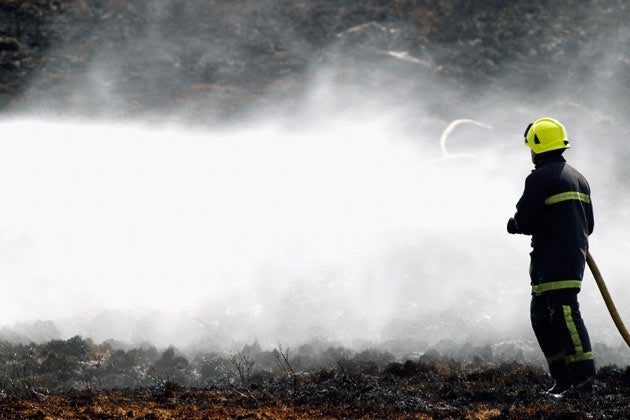Rain to aid heathland wildfires fight

Much-needed rain could aid firefighters continuing to battle heathland fires which have been burning across the UK, forecasters said today.
Royal Berkshire Fire and Rescue Service is still tackling heathland fires which broke out in the Swinley Forest area earlier in the week, but Lancashire crews expected to finish battling blazes today.
Weather experts predict above average temperatures in many parts of the country over the weekend, but an outbreak of thunderstorms should provide some respite.
Police investigating the Swinley Forest fire have arrested two youths on suspicion of arson.
A police spokesman said: "Thames Valley Police can confirm two 14-year-old boys have been arrested in connection with an arson, however the location of this arson is not clear from the evidence available, and it has not been definitively linked to the fires in Swinley Forest.
"The youths have been released on bail until next month."
Lancashire Fire Service said they expected to conclude their activities today as the moorland fires were close to being extinguished.
Some 32 of the county's 39 fire stations had been occupied for the best part of a week.
Firefighters were dampening down a new blaze which erupted in the early hours of this morning at Darwen, in the West Pennine Moors. At its height six fire engines and over 30 firefighters fought the fire.
Greater Manchester Fire and Rescue Service said they were still attending fires at Turton, near Bolton, and Saddleworth.
The hottest April on record, which saw only 21% of the expected rainfall in England and Wales, has caused vast areas of parched, tinder-dry land to go up in flames over the past week.
It is believed most of the fires, which have caused widespread damage to scenic beauty spots and conservation areas, were started deliberately.
Strong winds and very little rainfall has hampered the efforts of hundreds of firefighters and emergency workers, with helicopters being used to drop water in the worst-affected regions.
Matt Dobson, a forecaster from Meteogroup, the weather arm of the Press Association, said: "Tomorrow will be another warm day from central and eastern England downwards.
"We could see temperatures as high as 25C near London.
"Across the west and up to Scotland it will be a little bit over average temperatures, but generally under 20C."
On Saturday night thunderstorms are expected to break out after the spell of fine weather.
"Sunday is predicted to be fresh and breezy, which will help the situation with the wild fires," he added.
Crews in Northern Ireland have fought more than 1,000 gorse and forest fires in the past four days, in what chiefs said was the busiest time in 30 years.
Around 200 personnel, including soldiers, have battled 255 fires in 31 locations since Tuesday, according to the province's deputy chief fire officer Chris Kerr.
In the Scottish Highlands, wildfires broke out in Inverkirkaig, Lochailort and in Newton of Ardtoe in Salen, while the National Trust for Scotland said at least £100,000 of damage had been caused to its forest regeneration project in Torridon and Kintail.
A fire in heather and gorse at the Queen's Balmoral estate, which started on Monday, is now under control.
North Wales Fire Service warned of the fire hazards of Chinese lanterns being released into the air.
Spokesman Dave Evans said: "With the increasing use of Chinese lanterns at wedding ceremonies and other celebratory events, the public needs to be aware that these lanterns have a number of associated problems.
"Our primary concern is the risk of a smouldering lantern causing a fire and the injuries they can cause to livestock if consumed by the animal."
Mr Evans said the fuel cells in the lanterns have embers which can fall to the ground and carry on glowing for a number of minutes even after the flame has gone out.
He added: "The ground is currently so dry that we would urge anyone enjoying the countryside to take great care - it is extremely easy to cause a fire with a discarded cigarette or an unattended campfire."
Meanwhile the RSPB warned that fires could have affected up to 40% of the English population of twite, which is a type of finch.
In England, nesting twite are confined to the South Pennines, where around 100 pairs nest in small colonies.
An RSPB spokesman said: "Even before these fires, the twite was one of England's most threatened birds. But blazes have possibly affected more than a third of the English population.
"This could be a devastating setback for this bird. We have been working hard with farmers to help retain landscape features, like hay meadows, which are crucial to the bird.
"But inevitably England's most threatened finch has been hit hard by these fires. We hope that the bird will have a future in England."
Join our commenting forum
Join thought-provoking conversations, follow other Independent readers and see their replies
Comments
Bookmark popover
Removed from bookmarks